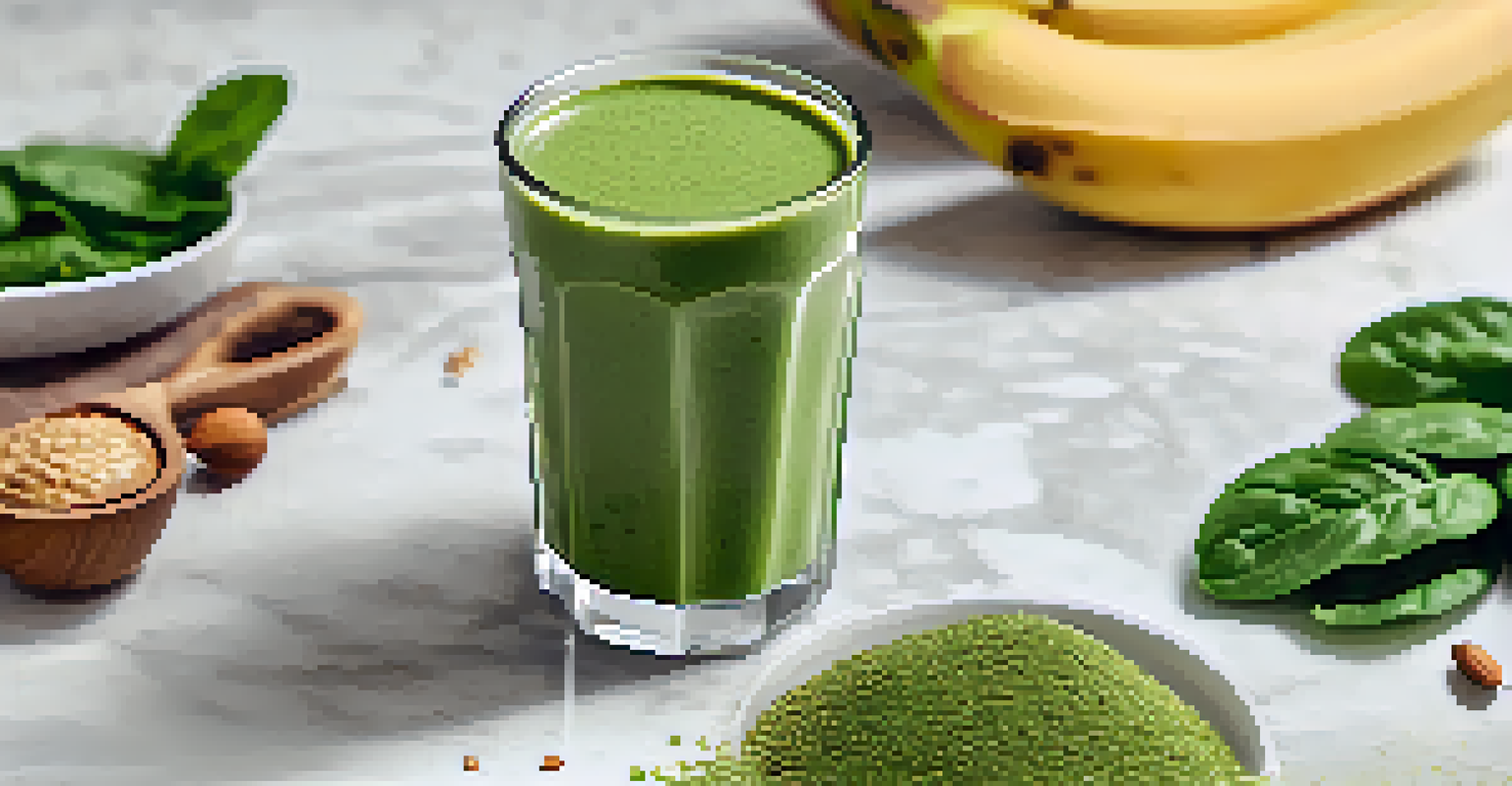Nutrient-Rich Foods for Athletes on Vegetarian Diets Explained

Understanding the Vegetarian Athlete's Nutritional Needs
Athletes following vegetarian diets face unique nutritional challenges. Unlike their omnivorous counterparts, they must be more mindful about getting enough protein, vitamins, and minerals to support their active lifestyles. Understanding these needs is crucial for optimizing performance and recovery.
Let food be thy medicine and medicine be thy food.
Key nutrients to focus on include protein, iron, calcium, and vitamin B12, all of which are vital for energy production and muscle repair. A well-planned vegetarian diet can meet these needs, but it requires some knowledge and strategy. Being informed is the first step towards ensuring your body gets what it needs.
Additionally, it's important to recognize that not all vegetarian diets are created equal. Some may lean heavily on processed foods, which could lead to nutrient deficiencies. Therefore, a focus on whole, nutrient-dense foods is essential for any athlete.
Protein Sources for Vegetarian Athletes
Protein is the cornerstone of muscle repair and growth, making it especially important for athletes. Fortunately, there are plenty of vegetarian sources, including legumes, nuts, seeds, and dairy products. For example, lentils and chickpeas are not only rich in protein but also versatile and delicious.

To ensure adequate protein intake, athletes can incorporate a variety of these sources into their meals. Mixing different protein sources can also enhance the amino acid profile, making it more complete. For instance, pairing rice with beans creates a complete protein that provides all essential amino acids.
Key Nutrients for Vegetarian Athletes
Athletes need to prioritize protein, iron, calcium, and vitamin B12 to support their active lifestyles.
Additionally, plant-based protein powders can be a convenient way to boost protein intake, especially post-workout. Options like pea protein or hemp protein are excellent choices that blend well into smoothies or oatmeal.
Iron-Rich Foods to Combat Fatigue
Iron is crucial for oxygen transport in the body, and athletes need to pay special attention to their levels. Vegetarian sources of iron, known as non-heme iron, include spinach, lentils, and fortified cereals. However, this type of iron isn't absorbed as efficiently as heme iron found in animal products.
You are what you eat, so don’t be fast, cheap, easy, or fake.
To enhance iron absorption, pairing iron-rich foods with vitamin C sources like citrus fruits or bell peppers can be beneficial. For example, a spinach salad topped with orange slices not only tastes great but also boosts iron absorption significantly. This simple trick can make a big difference in energy levels.
Regularly monitoring iron levels through blood tests can help athletes avoid fatigue and maintain peak performance. Incorporating a variety of iron-rich foods into their diet will ensure they are fueling their bodies correctly.
Calcium Sources for Strong Bones
Calcium is essential for bone health, particularly for athletes who put stress on their bones through training. Dairy products like yogurt and cheese are well-known sources, but there are plenty of plant-based options too. Leafy greens like kale and fortified plant milks can provide ample calcium for those avoiding dairy.
Incorporating a variety of calcium sources into daily meals can help meet the recommended intake. A smoothie with fortified almond milk, spinach, and a scoop of nut butter can be both delicious and calcium-rich. It's all about creativity in the kitchen!
Diverse Food Sources Are Essential
Incorporating a variety of whole foods, including legumes, nuts, and leafy greens, is crucial for meeting nutritional needs.
Athletes should also be aware of their vitamin D levels, as it aids calcium absorption. Spending time outdoors and consuming fortified foods can help maintain healthy levels, supporting overall bone health.
Vitamin B12 Sources to Support Energy Levels
Vitamin B12 is vital for energy production and nerve function, but it is primarily found in animal products. This makes it a crucial nutrient for vegetarian athletes to monitor. Fortified foods like plant-based milks, breakfast cereals, and nutritional yeast can help bridge this gap.
Supplements are another option for those who struggle to get enough B12 from food sources alone. It's essential to consult with a healthcare provider to determine the best approach, as maintaining adequate levels is critical for sustained energy and focus.
Regularly checking B12 levels through blood tests is a good practice for vegetarians. This proactive approach can help prevent fatigue and ensure optimal athletic performance.
Omega-3 Fatty Acids for Heart and Brain Health
Omega-3 fatty acids play a key role in heart and brain health, which is particularly important for athletes. While they are commonly found in fatty fish, vegetarian sources like chia seeds, flaxseeds, and walnuts can provide these essential fats. Including these foods in your diet is vital for maintaining overall health.
Adding ground flaxseed to smoothies or oatmeal is an easy way to boost omega-3 intake. Similarly, chia seeds can be used to make puddings or added to baked goods. The versatility of these ingredients makes it simple to incorporate them into everyday meals.
Hydration Plays a Vital Role
Maintaining proper hydration through water and hydrating foods is essential for optimal athletic performance.
For those seeking additional support, algae-based supplements are available, providing a direct source of omega-3 fatty acids without the fish. This ensures that vegetarian athletes can maintain optimal heart and brain health.
Hydration: The Overlooked Nutrient
While hydration might not be a nutrient in the traditional sense, it's critical for athletic performance. Dehydration can lead to fatigue, decreased performance, and even serious health issues. Athletes on vegetarian diets should pay attention to their fluid intake, especially during intense training sessions.
Water is the best choice for hydration, but athletes can also benefit from incorporating hydrating foods. Fruits and vegetables like watermelon, cucumbers, and oranges not only provide hydration but also deliver essential vitamins and minerals. Snacking on these during training can help keep hydration levels up.

Additionally, electrolyte-rich drinks can be helpful during longer workouts or competitions. Choosing natural options, like coconut water, can provide the necessary electrolytes without added sugars.
Crafting a Balanced Vegetarian Meal Plan
Creating a balanced meal plan is essential for vegetarian athletes to ensure they meet their nutritional needs. Focus on incorporating a variety of foods from different food groups, including whole grains, legumes, fruits, vegetables, nuts, and seeds. This diversity not only helps meet nutrient requirements but also keeps meals interesting.
Meal prepping can be a game-changer for busy athletes. Cooking in batches and planning meals ahead of time can make it easier to stick to a healthy diet, even on hectic days. Think of it as setting yourself up for success with the right fuel for your workouts.
Lastly, listening to your body is key. Everyone’s nutritional needs are slightly different, so pay attention to how certain foods make you feel during training and adjust your meal plan accordingly. This personalization will help you optimize your performance and recovery.